"When you have seen one ant, one bird, one tree, you have not seen them all." -E.O. Wilson
Sure, there are entire worlds within our world that we never even give a second thought to. There's an entire subterranean Universe to explore, and you might get the feeling to do it if you listen to Mecca Bodega's rumbling sound, in
But as soon as those tiny critters begin invading your house, the wonder goes right out the window. In fact, you probably haven't thought much about them in terms other than how-to-poison-them in a long time.
But as a kid, I was often fascinated with the world of the tiny, insignificant ant. Scientifically, of course, there's the entire field of myrmecology, or the study of ants. But what you may not know is that the ant-hole goes far deeper than you may have realized. Thanks to one researcher, you're about to see exactly how.
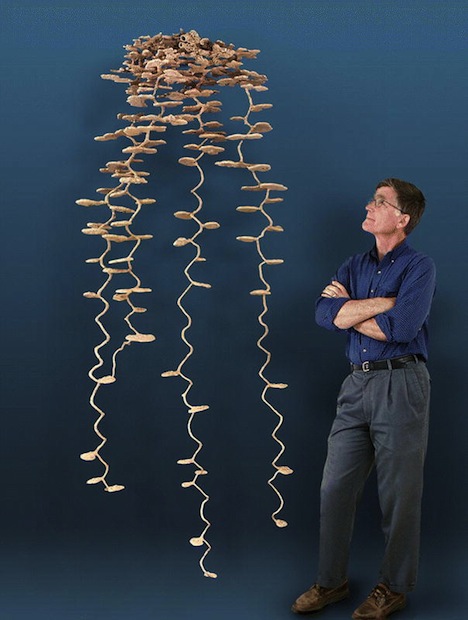 Image credit: via Tschinkel WR. 2004. http://www.insectscience.org/4.21/
Image credit: via Tschinkel WR. 2004. http://www.insectscience.org/4.21/
Florida State professor Walter Tschinkel has been studying the structure of ant colonies for a long time, and has taken castings of the entire underground structures of them! While I'd always thought that colonies had multiple, interconnected pathways, I never knew how varied and deep some of them went.
As you might expect, similar species build similar-structured colonies, while varieties exist between species as far as the number of deep crevasses and spacing between the large areas.
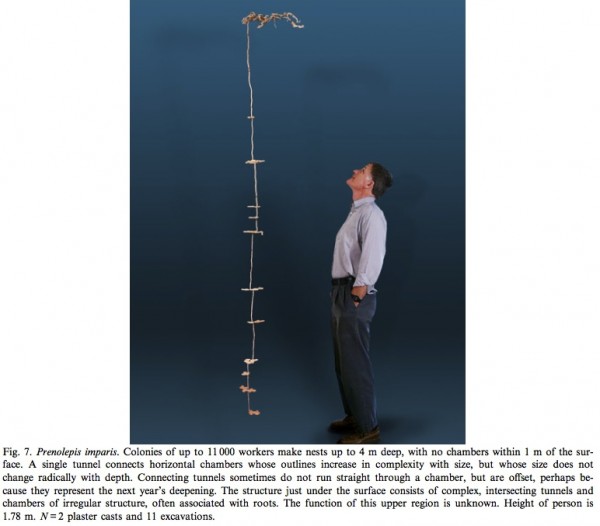 Image credit: W.R. Tschinkel, 2002, http://bio.fsu.edu/~tschink/publications/2003-3.pdf
Image credit: W.R. Tschinkel, 2002, http://bio.fsu.edu/~tschink/publications/2003-3.pdf
These colonies can achieve depths of more than 12 feet, can house anywhere from hundreds to more than 10,000 ants, and usually have the youngest ants in the lowest levels; the ones that live closest to the surface are full-grown adult ants, already towards the end of their life cycles.
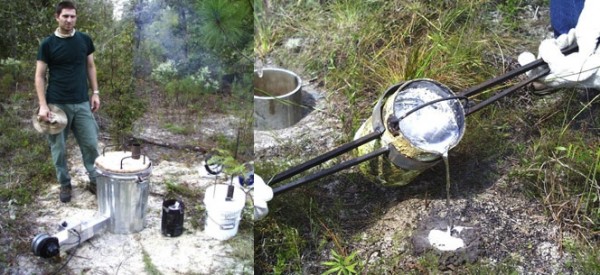 Image credit: Janet Chao of http://illustrationrevealed.wordpress.com/.
Image credit: Janet Chao of http://illustrationrevealed.wordpress.com/.
But what makes this most spectacular, to me, is that instead of using plaster casts, which broke apart easily and allowed one to count the ants inside, Walter Tschinkel now uses molten metals -- either zinc or aluminum -- to cast the entire colony at once, incinerating the ants and creating one, single metal structure that can be dug up completely intact!
And the structures that come out are simply amazing, as you can see for yourself in a number of publications.
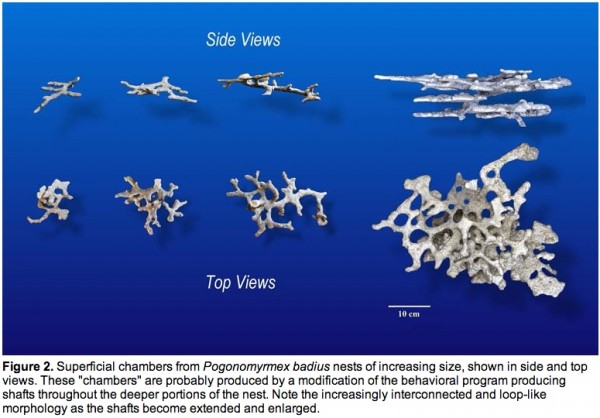 Image credit: via Tschinkel, WR. 2004. http://www.insectscience.org/4.21/
Image credit: via Tschinkel, WR. 2004. http://www.insectscience.org/4.21/
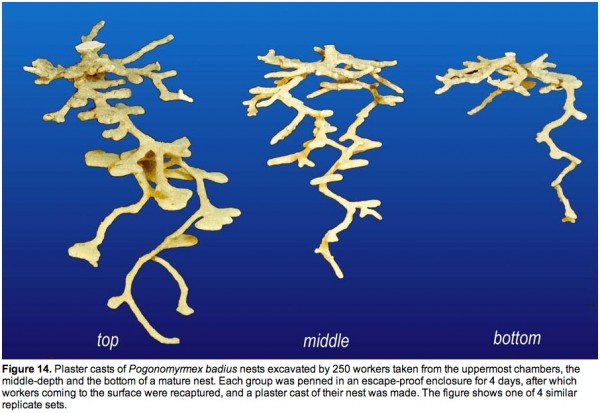 Image credit: via Tschinkel WR. 2004. http://www.insectscience.org/4.21/
Image credit: via Tschinkel WR. 2004. http://www.insectscience.org/4.21/
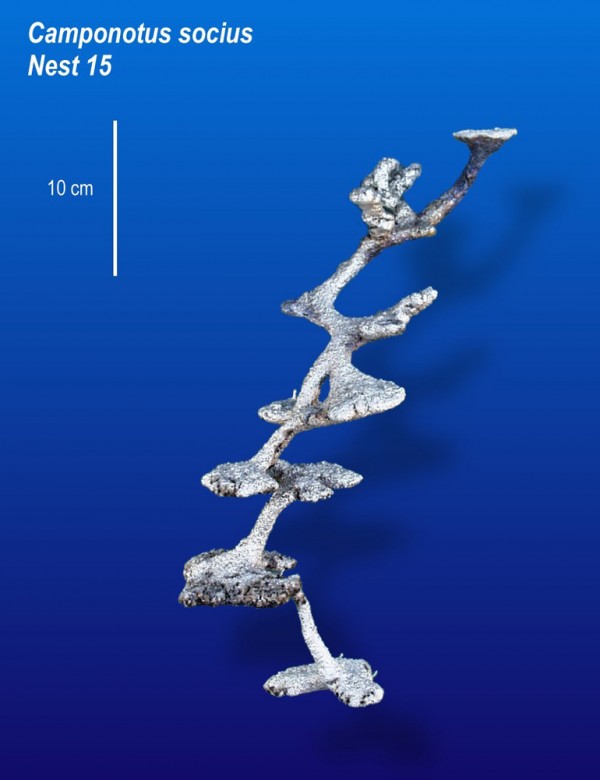 Image credit: via Tschinkel WR. 2004. http://www.insectscience.org/5.9/
Image credit: via Tschinkel WR. 2004. http://www.insectscience.org/5.9/
There are more pictures available here, and a great interview with Tschinkel here, from which I learned how you can tell how old an ant is:
We do so by tracing the pigmentation of the ants—the ants are pale when first becoming the adult, so we can look at color of ants throughout different parts of the nest and find that there are more pale ants near the bottom. Or we look at mandible wear—the older the ant, the more wear there is on their mandible. With this method we judge their relative age based on relative wear.
And that's how you learn that the youngest ants are in the bottom chambers, and that the oldest ones are out foraging for food! For those of you who'd like to see a video of how this works, here's a short news segment on Dr. Tschinkel taking these amazing casts!

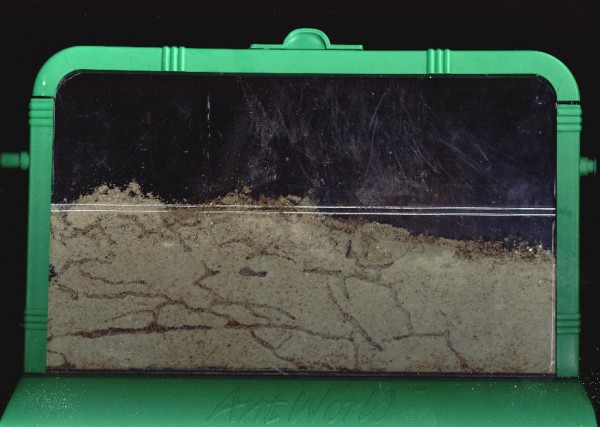
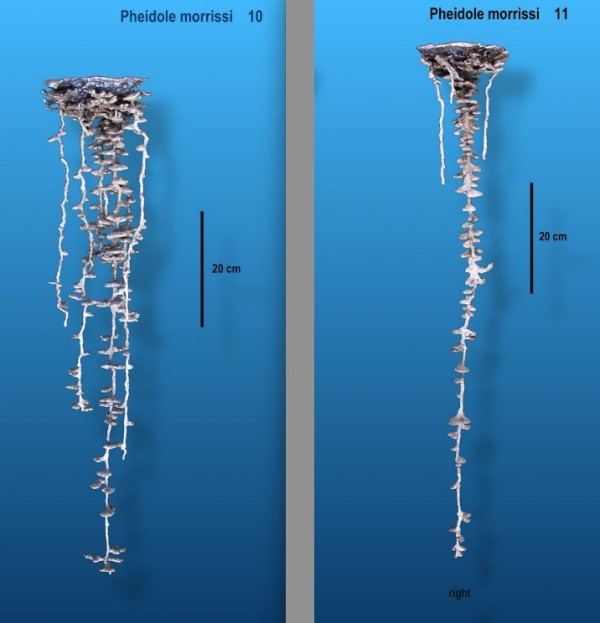
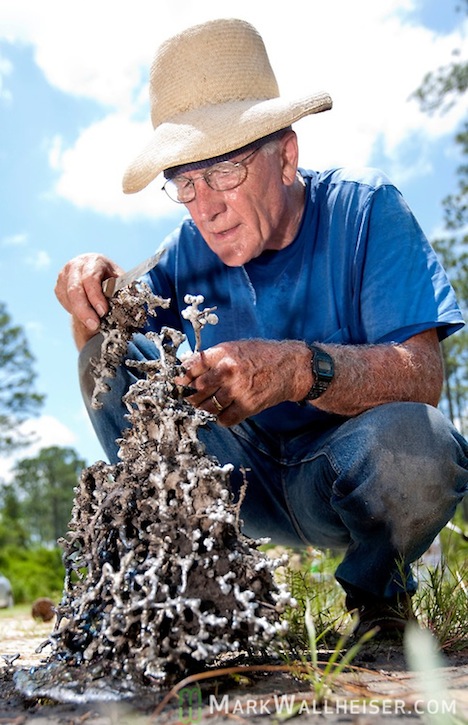
How do we wish to learn the structure of an ant colony?
- by killing 10,000,000 or more ants with molten metal
- OR by using GPR (Ground Penetrating Radar) http://www.groundpenetratingradararizonagpr.com/concrete_scanning.html
-OR maybe some kind of sonar (in between medical and the oil exploration sonar)
The GPR or Sonar have the benefit of getting a digital 3D image; whereas the molten metal cast requires another step to get 3-D digital data.
Of course GPR or Sonar also leave the insect colony alive.
Well if you were going to kill the colony of ants anyway by putting up a parking lot; then what's the difference asphalt or molten metal.
But in the middle of a forest or natural area as the above photographs indicate. Well why not just begin gratuitously destroying the planet earth, 1 ant mound at a time; without regard to either the environment or the pain of the animal species.
I mean one ant colony here, another assault on planet earth there. Human damage to planet earth will never amount to much. Just ask the anti-global warming crowd.
As they say, "young children, who pull the wings off of bees or burn ants with a magnifying glass, grow up to be biologists or psychopaths."
"from now on, it’s molten metal all the way!"
OkThen.
I guess you need to start a SAVE THE ANTS movement. I just hope you won't be chaining yourself to any anthills.
For just $200 a day you could sponsor an ant hill. Just send payment to my house and I'll take care of the rest. Think of all the ants that need your help. Donate today.
If you're feeling depressed, OKThen, get ready to feel worse:
http://www.guardian.co.uk/environment/2013/feb/25/litter-deepsea-survey…
I have to agree with OKThen. Burning down an entire ant colony just so you can study them is totally wrong in my book.
Yes, there are billions of them.. but still. It's just wrong.
Well, you can see *some* use in early work.
The first forays into medical science were gravediggers looking for dead and not decaying bodies, taking them apart and then needing a lot more dead bodies in case the reason why the person is dead is because that bit you're looking at is done wrong.
Passionate insect observers like J. Henri Fabre, O. W. Osborne just don't get it.
I mean pouring 10 tons of cement down a super ant colony is really BIG science. https://www.youtube.com/watch?v=g7VhvoMFn34 skip to the end to see a giant former ant colony being dug up. And these scientist now know that their dead THING is definitely the BIGGEST.
"But what makes this most spectacular, to me, is that... Walter Tschinkel now uses molten metals — either zinc or aluminum — to cast the entire colony at once, incinerating the ants and creating one, single metal structure that can be dug up completely intact!"
J. Henri Fabre's 1914 book Social Life in the Insect World can be read here
http://books.google.com/books?id=XdA-AAAAYAAJ&printsec=frontcover&dq=j…
The NOVA program Lord of the Ants about E. O. Wilson http://www.pbs.org/wgbh/nova/nature/lord-ants.html
But read Fabre and Wilson only if you want to learn about insects.
Trophy hunters stick with metal, i.e. molten metal here, 100 rounds of bullets there, improvised explosive devices (with armor penetrating molten metal) elsewhere. Metal is the future of biology.
Trophy hunting, whether for ant colony structures or rhinocerous heads or an insane moment of fame, is just part of the inescapable logic of our culture of sex and violence.
As Mae West said, "Is that a gun in your pocket, or are you just happy to see me?"
I mean we can't go through life without killing other life, e.g. especially ants and people.
Respect for life is just an excellent political slogan. I mean who really cares about ants? Or even science?
"Cosmologist Brian Swimme concludes in a 1997 interview:"I think that what E. O. Wilson is trying to suggest is that to be fully human, a person has to see that life has a heroic dimension... I think for the scientist, and for other people, it's a question of, "Is the universe valuable? Is it sacred? Is it holy? Or is the human agenda all that matters?" I just don't think we're that stupid to continue in a way that continues to destroy."" wikipedia
Scientists like O. W. Wilson and Brian Swimme just don't get it. We are just stupid enough to continue to destroy; because it is Necessary Violence; which is really quite different than Unnecessary Violence.
I mean once you get the hang of this logic; you can do anything.
"In fact, you probably haven’t thought much about [ants] in terms other than how-to-poison-them in a long time."
I don't really enjoy when articles talk down to their audience like this. I think about things like this often, as do many of my friends. Not because we are scientists, either. Just curious people. There are a lot of curious people.
John James Audubon, the famous naturalist and painter of birds, namesake of the Audubon Society which works to preserve bird habitats and spread awareness, did his ornithology the old fashioned way: with a shotgun.
Which, as a random fact of no consequence to non-birders, is why so many birds are named after features that are useless as field markings because they're only readily apparent if you're holding one in your hand.
As a fact of consequence -- ornithologists were not responsible for diminishing the populations of birds. It was later, when commercial hunting began, that birds were hunted to extinction (which is only a subset of extinctions; most were due to habitat destruction, with invasive species playing a secondary role). Also orthithologists did not shoot birds "gratuitously". They did it because it was the only way to study the birds in enough detail to understand their structure.
Now of course high-quality optics have made it so that we don't need to shoot birds to study their physical features (and obviously it's vastly superior for studying behavior to have a live bird).
When Ground Penetrating Radar is precise enough and cheap enough for entomologists to study ant colonies in-tact with them, then they will use them. Meanwhile, creating a colony cast here and there is not an "assault on the earth". It's studying the earth. If and when the commercial market for metal ant colony casts kicks in and you have thousands of people making them full-time, that's when you should worry.
In the meantime, cut the hysterics, or cut off your internet, phone, sewer, water, gas, and every other utility which killed far more fauna than these folks ever did.
"But read Fabre and Wilson only if you want to learn about insects. "
If I do read it, will I learn than Fabre and Wilson never took insects?
And will I also learn how they re-created all the learning that other entomologists have done by examining dead insects under microscopes, and carefully comparing them to other species? Or rather, based on the implication that anything "learned" as a result of killing insects isn't learning, did they find a way to take that not-learning and turn it into learning?
"I don’t really enjoy when articles talk down to their audience like this."
Though you realise this is talking down to the blog writer and his audience, right?
CB, you are right, and the impact on biosphere is negligible. However it's still not right, and if we want to really preserve the planet, then mental awareness should follow.
There is no arguing that there are necessary evils for greater good... if we can phrase it like that. But let's not get excited and say how cool this is... if we know that the entire colony was basically armagedoned.
Could it be that they can't find an abandoned tunnel system? Or simulate it in the lab between the sheets of plexiglass?
It's not that I'm crying over ants. If you need to eradicate them cause they are eating your garden, or your home.. that's fine. I just think in principal it's very uncool to go into the wilderness and burn them down with molten metal, because I'm an an entomologist and I study their homes... ffs.
No hysterics, nor depression,nor even denial here.
The economy is tough, people are out of work, ants are everywhere and they are nutritious.
Kick start the global economy by going into the ant business:
1) a 1 lb box chocolate covered ants sells for $50.
2) a 10 lb metal ant colony sculpture (extermination of ant colony a fringe benefit) $600 (on sale now regularly $1200)
3) a 1lb bag of freeze dried insects ("5 popular edible bugs including bamboo worms, silk worms, big crickets, mole crickets and buffalo dung beetles. The insects are collected fresh and then quick frozen, cleaned, dehydrated, seasoned and then packed in a special vacuum pouch with an oxygen and moisture absorber. These insects can be eaten straight from the bag.)" only $5 plus $15 shipping to US.
But before making your businessness decision to jump start your personal economic situation (if not the global economy) please note: "Military survival manuals clearly state that insects should be eaten as a PERFECT alternative when other food sources are not available. The success of this suggestion was widely publicized in 1996, when Lieutenant Scott O'Grady lost his plane to enemy forces in Bosnia, then survived in the forests by eating ants."
If you don't think ANTS are the future; just ask Air fForce Pilot Lieutenant Scott O'Grady about the future of the ant snack food business. "And for those of you who don't eat ants, they're crunchy, and they're sour."
So don't take my word, the US military or a decorated war hero. Ants are the PERFECT snack food business; "they're crunchy, and they're sour."
"Has he ever killed anybody? "Nope," Lieutenant O'Grady said firmly. "You know, violence is never the answer to any problem." While American kids enjoy freedom, children in some countries do not, and the U.S. military sometimes has to step in to protect their freedom, he said, explaining, "We were there to stop people from killing people."" LATimes
"If you need to eradicate them cause they are eating your garden, or your home.. that’s fine."
if you live in a nation with grocery stores, why is it okay to eradicate ants simply because you enjoy gardening, or enjoy the taste of fresh tomatoes? That seems ridiculously less justifiable from an ethical standpoint than killing ants because you want to better understand them. Sure it's "ironic", but not really. At least in this case they're dying for a specific scientific purpose. And yes, learning and killing sometimes go hand in hand.
If we can't call learning about the structure of ant's homes built in natural habitats "cool", then you can't call gardening cool. You can't call a person's house, or any work of architecture, cool. You can't call the Large Hadron Colider cool. You can't call the Space Shuttle cool. You can't call Mars Science Laboratory cool. And you sure as effin' heck can't ever call the Internet cool. Sooo many ant colonies (and other fauna, oh and let's not forget flora) destroyed to lay cable just so you can read about this particular un-coolness in between cat videos. Those sure justify the death of trillions of ants!
Oh wait, in those cases ant-murder was tangential. They were likely not even noticed and certainly not thought about. Therefore that's okay? What?
I've eaten ants (specifically the big black carpenter ants), and can concur with Lt. O'Grady's assessment of their flavor. I can also say fairly convincingly that ants are only going to be the future of snack food for stranded pilots and back-woods hikers short on food (who are also teenagers willing to eat anything).
Instead of spinning a "modest proposal" that apparently has some non-hysterical point that eludes me, why not consider my question:
Did Fabre and Wilson ever take (as in kill) insects so as to learn more about them?
If you choose to investigate this question, and when you inevitably find out the answer is "yes, of course they did, all entomologists do", maybe you can consider the difference between killing a few colonies to better understand colonies, and the MANY colonies YOU have killed simply to support your unnecessary creature comforts. Maybe you'll see how this isn't such a big deal. Or at least put it in perspective and stop being such a hysterical hypocrite.
This is a very cool article.
I don't read scienceblogs.com very offten, but I agree with the comment that the blog writer didn't really know his audience. Assuming people reading scienceblogs.com aren't thinking about ants is kind of a ridiculous assumption.
To #11: He wasn't talking down at all. You seem to have a dim understanding of what "talking down" is. (Spoiler alert: I'm doing it right now.)
"Assuming people reading scienceblogs.com aren’t thinking about ants is kind of a ridiculous assumption."
Can you answer me this: were you thinking of ants before you read this thread title?
No?
Then you weren't thinking of them, were you.
To #16, yes he was.
CB
Yes, John James Audubon should be the patron scientist of the NRA.
10 of his Birds of America are extinct or on the endangered species list.
Very prophetic.
John James Audubon was a hunter-naturalist. A scientist with a gun; who was unafraid to kill even the symbol of America, the bald eagle.
"The true story, however, is that Audubon didn't capture the eagle in the wild, didn't crawl over the precipice with his specimen. He bought it from a friend in Boston, a bird in a cage that cost fourteen dollars. Then he took it back to his hotel room, kept it in the cage for three days, and tried to kill it by covering the cage closely with a blanket, putting a pan of burning charcoal in the room, closing the door and windows tightly, and waiting for the eagle to die. It didn't work. After a few hours, Audubon writes, he "opened the door, raised the blankets, and peeped under them amidst a mass of suffocating fumes." There the eagle still stood, Audubon continues, "with his bright unflinching eye turned towards me, and as lively and vigorous as ever!" The next morning, to make the fumes even more toxic, Audubon added some sulfur to the smoldering charcoal, making the indoor environment a small-scale version of Hell itself, but again "the noble bird continued to stand erect, and to look defiance at us whenever we approached his post of martyrdom." Finally, to finish off the defiant bird and to make the martyrdom complete, Audubon "thrust a long pointed piece of steel through his heart, when my proud prisoner instantly fell dead, without even ruffling a feather.""
It takes a lot of courage to be a hunter-naturalist. Let's just call it the tough love of a naturalist-born-killer.
Of course, John James Audubon could have painted the bald eagle up close right there in his hotel room; and then released the bald eagle to the wild.
But Audubon more than an artist and naturalist; John James Audubon was a hunter for trophies.
"Once you get the hang of this logic; you can kill anything."
Bravado science!!
"Assuming people reading scienceblogs.com aren’t thinking about ants is kind of a ridiculous assumption."
I'm pretty sure that Ethan doesn't understand at least some of the audience for his writings, and I'm more than happy to join him in that confusion. We often get one really dumb line of argument in the comments to a given post, but this is a two-fer to remember.
Like I said, basically all ornithology in his day was done with a shotgun. And hunter-nationalists were very common then. Teddy Roosevelt being the most famous example of such a person. No one man has done more for preserving natural habitats than he did.
Even today hunters and environmentalists have similar priorities. The reason being that recreational hunters understand the importance of a thriving ecosystem to ensure the continuance of their sport.
It is first and foremost habitat destruction, then environmental damage, invasive species, and large-scale commercial poaching, that result in birds becoming endangered or extinct. Gun-totin' ornithologists from the turn of last century don't even make a blip on the radar.
So in light of that, what exactly do you think is "prophetic" about his birds being endangered or extinct? Do you think it was ornithologists, or habitat destruction, that caused the Ivory Billed Woodpecker to go extinct? Hint: It was the latter.
Here's what's "prophetic": That his work would be ignored by the general populace, who would go on destroying natural habitats willy-nilly, cutting down old-growth forest to make nice furniture from. Dumping the waste from the furniture factory into the water. Letting cats run free. And so on. Causing untold death and destruction, killing millions and millions of animals without even being aware, or giving a damn.
You aren't thinking about the plight of these birds, just like you give no thought to the countless ant colonies that were killed for no reason but so you could have a nice lawn and cute cat videos on the Internet. Oh, but then a scientists wants to actually learn something from the death of one, THEN you suddenly notice and get offended.
Out of Sight, Out of Mind -- you aren't a hypocrite if you just don't think about it so whatever you do don't think about it! That's the only "logic" in your posts.
Audobon's methods would not be accepted today, but he still did a great deal for nature by increasing understanding. Teddy Roosevelt did, too. Unfortunately, shallow viewpoints like yours that are founded in an emotional distaste of things that are done to gain knowledge and a hypocritical blindness to the big picture and your role in it is all too accepted.
CB
What science have we learned from the molten metal ant colonies?(i.e. that we didn't know before)? This is not a rhetorical question; please explain.
Ethan explanation, "I never knew how varied and deep some of them went... the structures that come out are simply amazing... These colonies can achieve depths of more than 12 feet." isn't very deep scientifically speaking.
If we are going to destroy an ant colony, a bald eagle, or a rhinoceros; we ought to learn or fill our stomach or have a trophy. So what did we learn from the metal ant colony; please someone explain why this isn't just trophy science.
Well Teddy Roosevelt is certainly the patron saint of the National Rifle Association. http://www.frfrogspad.com/trnra.htm
"The wind blew from him to us, and a rhino's eyesight is dull. Thirty yards from where he stood was a bush four or five feet high, and through the leaves, it shielded us from the vision of his small, piglike eyes as we advanced toward it, stooping and in single file, I leading. The big beast stood like an uncouth statue, his hide black in the sunlight; he seemed what he was, a monster surviving over from the world's past, from the days when the beasts of the prime ran riot in their strength, before man grew so cunning of brain and hand as to master them. So little did he dream of our presence that when we were a hundred yards off he actually lay down. Walking lightly, and with every sense keyed up, we at last reached the bush, and I pushed forward the safety of the double-barreled Holland rifle which I was now to use for the first time on big game. As I stepped to one side of the bush so as to get a clear aim, with Slatter following, the rhino saw me and jumped to his feet with the agility of a polo pony. As he rose I put in the right barrel, the bullet going through both lungs. At the same moment he wheeled, the blood spouting from his nostrils, and galloped full on. Before he could get quite all the way round in his headlong rush to reach us, I struck him with my left-hand barrel, the bullet entering between the neck and shoulder and piercing his heart. At the same instant Captain Slatter fired, his bullet entering the neck vertebrae. Ploughing up the ground with horn and feet, the great bull rhino, still head toward us, dropped just thirteen paces from where we stood. This was a wicked charge, for the rhino meant mischief and came on with the utmost determination." Teddy Roosevelt, Trophy Naturalist
So CB what have we learned about nature from
- Teddy Roosevelt, patron saint of the NRA
- John James Audubon, should be patron scientist of the NRA
Conclusion/discussion: Molten metal kills ant colonies, a long pointed piece of steel through his heart kills bald eagles and a doubled barrel rhino gun kills a charging rhinos.
Now that's THE WORST KIND OF SCIENCE HYPE.
Thank you Ethan, I enjoyed the post. The only good ant is a dead ant. Stop crying and admit you squash them when they are in your yard or house.
OKThen, what science have we learnt when we discover that the hippocampus has something to do with navigation?
And has the fact that the knowledge of that came from damaging living brains meant that the science is null and void?
Having other methods now (NMRI) does that mean we
a) should have waited
b) should continue with damaging brains
?
“Cosmologist Brian Swimme concludes in a 1997 interview:”I think that what E. O. Wilson is trying to suggest is that to be fully human, a person has to see that life has a heroic dimension… I think for the scientist, and for other people, it’s a question of, “Is the universe valuable? Is it sacred? Is it holy? Or is the human agenda all that matters?” I just don’t think we’re that stupid to continue in a way that continues to destroy.”" wikipedia
But does the human agenda not matter in the slightest?
@ CB
"That seems ridiculously less justifiable from an ethical standpoint than killing ants because you want to better understand them."
Because it's ok to beat someone up or kill(in extreme cases) in self defense or if your home or well being is threatened. But it's not ok to go pick a random person on a street and do the same.
Why is it less justifiable. First is survival of the fittest, the second is sick in my book. And ornitologists shooting birds is no less wrong in my book too. So I guess it's a matter of view. I also am no huge fan of feeding sharks from steel cages and poking them with radio locators, or any evasive study of nature. We have done that for 400 years cca. Think we can do better with what technology we already have.
I guess that my standpoint is that IF we want the nature to remain as it is now or improve, we should just leave it alone. Or try to make as little footprint as possible. And IMO biologists should be the first to set an example, not the last. If a biologist is allowed to pour molten metal into a species habitat and thus kill several hundreds of thousands of them... and do that repeatedly over years ( how many casts do you need... seriously?), then what is an "average" Joe allowed to do?
"But it’s not ok to go pick a random person on a street and do the same.
Why is it less justifiable."
So there may be some justification.
"Or try to make as little footprint as possible"
I can agree.
However, there seems to be disagreement about what "little footprint" means.
Large Blue butterfly flutters back from extinction, thanks to a tiny ant http://www.telegraph.co.uk/earth/wildlife/5542084/Large-Blue-butterfly-…
we are as gods
upon planet earth
the human agenda
must explicitly include
the implicit agenda
of other living creatures
the implicit value of
one organism to another
explicit human value
(if it is not trivial)
must include the
implicit value of the
web of life and death
on planet earth
are we worthy
caretakers yet
Tschinkle next to his incinerated ant colony, Audubon next to his dead defiant eagle, and Teddy Roosevelt next to his dead monster rhino are about human ego, the hunter's trophy, and "tabloid science".
OK, so how do you figure there's "Ego" at play over your "kill" of an Ant?
@OKThen
"What science have we learned from the molten metal ant colonies?"
Details of the full 3-D structure of ant colonies. By comparing them between species, we learn about how various branches of the ant family construct nests which gives us further hints about their organization, and even cognition, plus the evolutionary relationship between species.
"- Teddy Roosevelt, patron saint of the NRA"
Every scientific study conducted within the confines of a National Park, which preserve habitats which would otherwise be gone in some cases entirely, can be attributed to his actions. Many species protection and re-introduction projects would be impossible without these protected lands.
"- John James Audubon, should be patron scientist of the NRA"
Physical structure, patterning, and behavior of many species of North American birds, including 25 new species. Yes, behavior. "Derp, how do you get behavior from a dead bird?" I hear you unthinkingly ask. He did a huge amount of field work and observation of live birds. His contribution to ornithology cannot be understated.
It can, of course, be completely ignored by some dunce asking rhetorically "Derp, what did we learn about nature from John James Audobon?" and myopically assuming the answer is "nothing".
Meanwhile, still not a single thought for all the ant colonies destroyed by your life and what you gained from them. Ignorant hypocrite.
@ Sinisa
"Why is it less justifiable. First is survival of the fittest, the second is sick in my book."
How is your backyard vegetable or flower garden a matter of "survival of the fittest"? Unless you're a professional or subsistence farmer, then it isn't. It's just a thing you like to do because you enjoy the gardening, or the flowers, or supplementing your already sufficient food stores with fresh vegetables.
So if an ant colony gets in the way of one of your goals, no matter how trivial, that's justifiable as a form of "survival of the fittest".
Fine. The ants in the ant colony the cast was made of were in the way of the goal of understanding ant colony structure.
Sounds like a much better justification to me than "I like begonias" or "grocery store tomatoes are sooo flavorless".
OKThen,
I see what you're trying to say (I think) about the ant killing is "much ado about nothing" (not really tho-- structures in the universe are trending to be similar (fluid dynamics, gravity etc) and any more evidence of structure in what seems like a random point in space is a real & relevant discovery), but I do not have a single clue to what is your point? This is a science forum where Eathan explains the scientific method and theory and applies it to his own studies of astronomy, physics & the universe In general... Like I said structure in theoretical physics is a very hot topic... Whether its a galaxy, a hurricane or a sea shell.... What's your beef?
You should go to animal activists sites and post this article there... Then you can find more like you and more people will understand your point (whatever it is-- is it that we can't do anything that harms anything, anytime? Anywhere? What happens when you squish a bug driving w your car?!! Do you like, pray or make up your murderous killing to somehow? What if you were rushing a family member to the hospital and then you squashed the bug? What if, in developing a super device that saves bugs from windshield deaths, your device had a defect and "squish"....)
Idk ... In your world I think we'd all starve and nature would have no problem (ants included) eating you, your home and everything else IMHO... I'm embarassed about your rant
CB
Beyond the hype, the National Parks web site has a 65 page book that covers 1870 to 1940 titled:
A Brief History of the National Park Service http://www.cr.nps.gov/history/online_books/kieley/index.htm
Teddy Roosevelt is mentioned twice in passing, pg 6 & pg 13.
"In 1902, Iowa Congressman John F. Lacey, who chaired the House Committee on the Public Lands, traveled to the Southwest with the rising anthropologist Edgar Lee Hewett, to see for himself the extent of the pot hunters' impact. His findings, supported by an exhaustive report by Hewett to Congress detailing the archaeological resources of the region, provided the necessary impetus for the passage of the legislation." wikipedia
Regarding the science learned or hoped to be learned from entombing entire ant colonies, I find no papers. Please provide a link.
I find only research papers discussing the techniques of entombing a colony of ants.
I'm sure Tschinkel's freakin private residence can make for some amazing molten metal structures as well...
So could yours, Aen.
Basements are an unusual structure. :P
Like it or not, I'll side with OKThen and the ants. I can't appreciate killing so many living organisms for - what, actually?
I love you blog, Ethan, but I also find it very sad that National Geographic, a magazine supposed to support the conservation of nature would endorse an article (even if it's from you) about ant incineration. National can better: in August 2007, they said this about ants: "They groom each other. They use tools. And they love hang gliding". In May and July of 2007, more articles on ants were published. Read them, and you'll never praise ant incineration again.
It is much easier to pour aluminum down an ant hole when you realize that if you do, you really don't have to justify it. Let others like those in this thread who take sides enjoy their discord. It is what they want, what they live for.
I eat chicken at Wendy's with nary a thought about the life lost to help me live, except that I'm grateful for it. Those who complain about loss of any life might be more believable if they protested the pest extermination industry which kills arthropods of all stripes for no more reason than someone paid them to without furthering any knowledge whatsoever.
Have any of you who pretend to side with the ants realize how nasty poisoning is in terms of how long it takes a bug to die? Or the pain it suffers? Molten aluminum and zinc are instantaneous.
Any benefit we gain from ant castings has more value than nature gives for the billions of lives lost each day predators survive to eat more. Nature gets no value because "nature" isn't a sentient being. If you believe it is, then you've just brought religion into the mix.
I've seen these videos of making casts of ant holes both large and small and I'd love to have one. There are already someones out there making them for people so that the someones can survive. The coolness of these casts may inspire someone to study ants more. There are many kinds of value out there, and some of them conflict.
What I've noticed about natural things living or inanimate is that the only reason we protect areas of natural beauty is because we like areas like that. Simply just because. Nature doesn't care. Nature, as it were, will let life develop for millions of years, then toast it with a supernova for no reason at all. The only value there is, is that which WE place on things, and all the trade offs that flow from that. I value the aluminum sculpture more than the ant colony that died to make it possible. If you believe this to be unethical, you must be able to see the humor in arguing here, then going out and participating in civilization without any thought for all the consequences that follow from it.
The real war being fought in this thread is not whether or not ants have a right to exist, but rather who loathes humanity and what it does to "nature" to the point of expressing that the world would be better without us here. The other side immediately capitulates by having to justify why they do anything that they simply want to do. They needn't do so. They should be proud that they are sentient and have power to organize the world the way they want. I am. :)
For all of you people who argue that life is important, you really don't believe what you say. Proof is simple. We go to your place of abode, or your workplace, and I'd be willing to bet that you don't have ants and roaches and bedbugs or mice and rats in those places. At least if you have anything to do about it. You are happy to not have those living things around and are willing to kill them to ensure it stays that way. I laugh inside, as I am easily amused as I watch all the contortions to argue that life, even the bugs have intrinsic value worth making an ethics code to protect, when the real value is that which gets chosen because you like one value more than another.
All this makes a great introduction to this piece by the Arrogant Worms: "Carrot Juice is Murder." Life is too much fun to take such a stifled view.
http://www.youtube.com/watch?v=KmK0bZl4ILM
One last point about "nature": 99.9999999999 (to 30 digits to the right of the decimal) is empty space. And that is pretending that matter is solid the way we see it. Of the infinitesimal amount left, a very large amount of it, exceeding 99% is inhospitable to life because it is too hot, too cold, wrong mix of elements etc. By that standard, nature hates life. Which means that our earth is a wicked, unruly project that should be made to conform with the rest of the universe. Just because. :)
And Man said, "Let us cast out the ants!" And it was so.